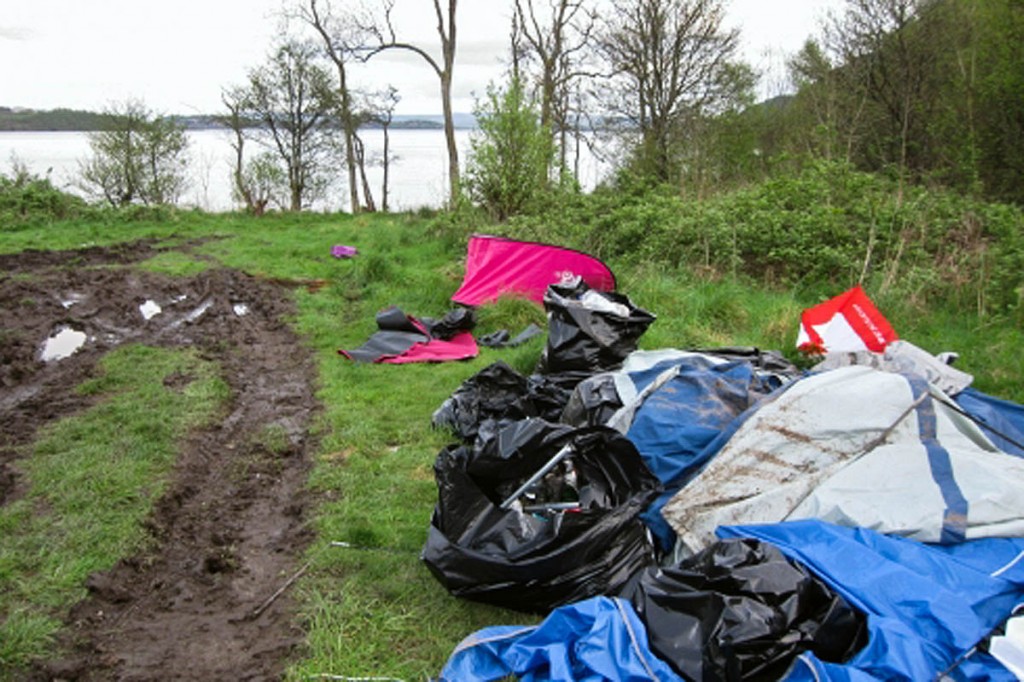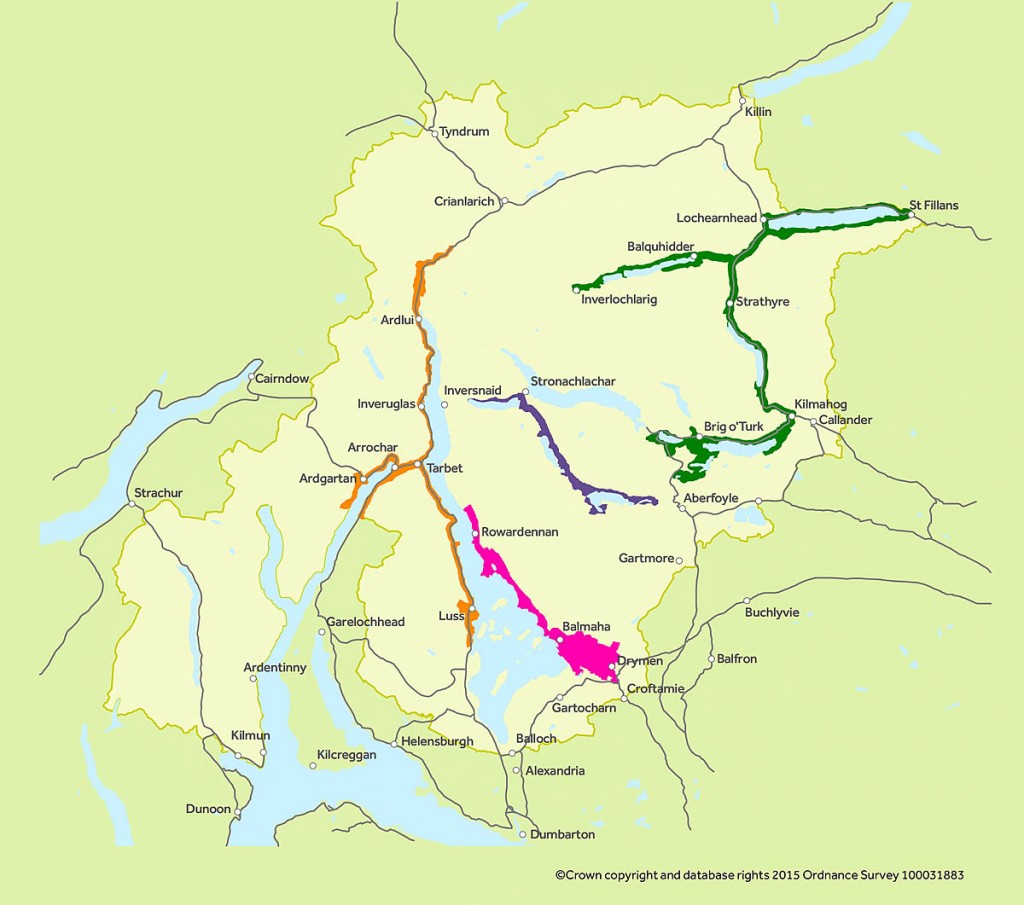
A site on the west shore of Loch Lomond where a large amount of rubbish was left. Photo: Loch Lomond and the Trossachs NPA
A national park authority has approved plans to ban camping along lochshores in its area.
Loch Lomond and the Trossachs authority’s board today unanimously agreed to the proposals, which have been described as disappointing by walkers’ groups.
The plans, which will see bylaws introduced to prohibit camping along lochshores besides roads, will now go to the Scottish Government for final approval.
The authority wants to create four camping management bylaw zones on its busiest lochshores, covering 3.7 per cent of the park’s total area, where environmental damage and anti-social behaviour have been an increasing problem over recent years.
Linda McKay, convener of Loch Lomond and the Trossachs National Park Authority board, said: “The board was unanimous in its decision.
“The consultation showed tremendous support for the proposals at both a local and national level including from all our community councils and constituent local authorities, as well as national agencies concerned for the protection of the national park’s sensitive environment.”
A recent public consultation showed opinion was split on the plans, with 50 per cent opposing and 49 per cent in favour.
Ms McKay said: “We appreciate the range of views from many different interests. However, on balance, we believe our duty first and foremost is to conserve the environment of this special place for the enjoyment of this and future generations.
“Conscious of our responsibility to promote access and recreation in the park, the board has sought to take a proportionate approach; introducing a range of measures designed to protect the special characteristics of this designated area of Scotland, while also striving to enhance provision for those who will continue to want to camp. We hope these new proposals show just how far we have travelled from the original position.
“Our proposals build on the success of wide-ranging measures introduced at east Loch Lomond and if we are successful in seeking Scottish Government approval for these new steps, we feel absolutely confident we can provide an outstanding national park experience for all.”
The authority said plans include the creation of 300 camping places, through a mixture of camping permits and low-cost campsites, in the first year in which the new bylaws would be operating.
But critics say the camping places should be put in place before any ban on wild camping comes into force.
Ramblers Scotland said: “Our preferred position would be for the new campsites plus other facilities to be up and running, and further monitoring to take place for a period before any bylaws are brought in, if required, as a last resort.
“We believe the need for bylaws has not yet been proven.”
A 30-day period for further submissions to the Scottish Government will now take place.
Ramblers Scotland said: “We are disappointed but not surprised by the board’s decision.
“The next stage of the process will be for Scottish ministers to approve the bylaws following a consultation process which we will use to make our case again. We now have this interim period to scrutinise the park’s plans and in particular their proposed new camping provision and other facilities.”
The Mountaineering Council for Scotland said: “Despite 51 per cent of respondents to the consultation opposing the bylaws, the national park has continued to pursue this policy and has ignored many of the comments made.
“Crime figures and statistics that were presented to the public in the consultation have been shown to have been misrepresented and comments from key organisations such as the local access forum have not been included in the consultation report.”
The council pointed out that other critics of the camping ban proposals include writer and broadcaster Cameron McNeish, and a former police chief inspector of the area, Kevin Findlater, who also argue that the bylaws are a blunt instrument that will affect law-abiding countryside users as much as the anti-social brigade, that they undermine Scotland’s hard-won access legislation, and that they will just displace problem camping rather than solving the real issues.
It has also been pointed out that much of the litter and problems come from day visitors, who will not be affected by a camping ban.
Iain Rennick, Scottish Natural Heritage area manager, said: “We’ve been working closely with the park authority as their proposals have developed.
“Together, we’re keen to protect the interests and rights of those who wish to exercise responsible access in the park as well as those who live and work there. We agree that a new approach is needed in tackling some of the visitor management issues in the park, and that this needs to involve a mix of existing and new measures.
“We particularly welcome the intention to invest in new camping facilities, as this will ensure that the high demand at peak periods is catered for and a better overall visitor experience is provided.”
Ian McEachern convener of Luss and Arden Community Council said: “As a resident of Luss who has to endure anti-social behaviour from large groups of campers every summer, I was delighted with the national park’s proposal to managing camping on West Loch Lomond.
“As part of our response to the Your Park consultation, Luss and Arden Community Council conducted a survey of all residents in the area. Of the 110 written responses, 95 per cent supported the proposals.
“Without a bylaw to manage camping, police are only able to act after anti-social behaviour occurs and they are limited in what they can arrest for. By the time they are contacted and able to respond, which is generally late on a Friday or Saturday night, the troublemakers are likely to be so intoxicated that they cannot be moved for their own safety.
“At times this has meant these campers continue to disturb residents and to damage property for the remainder of the night.
“As a community, we feel the proposed bylaws are essential and that they cannot come soon enough.”
More details of the proposals are on the Loch Lomond and the Trossachs national park website.

Nickleass Turgid
29 April 2015I have backpacked and wild camped up the east side of Loch Lomond, nae bother. However I've also witnessed appalling behaviour, littering and drunken behaviour by others around Rowardennan pier. Reluctantly I have to support the imposition of restrictions if they will deter the problem causers.